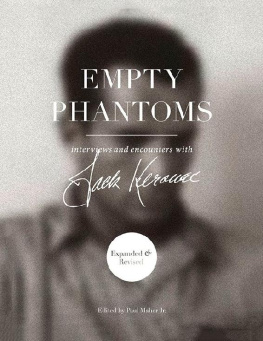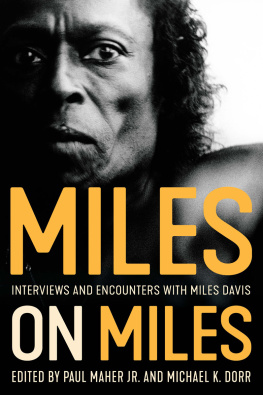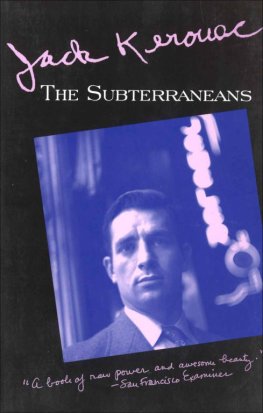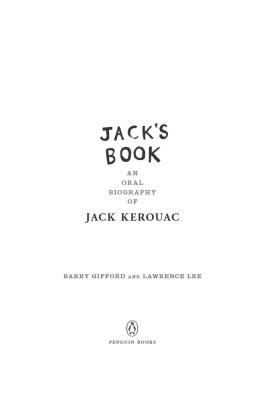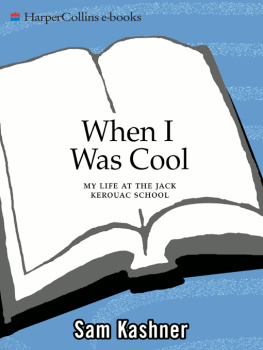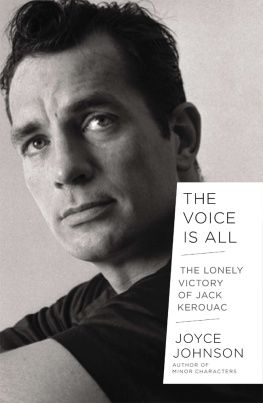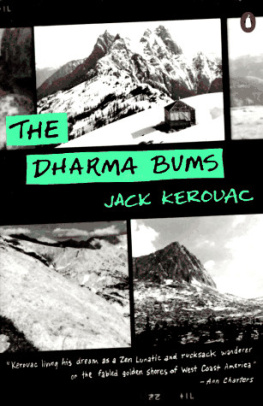Empty Phantoms: Interviews and Encounters with Jack Kerouac
Edited by Paul Maher, Jr.
Copyright 2 by Paul Maher Jr.
All rights reserved. No part of this publication may be reproduced or transmitted in any form or by any means, electronic or mechanical, including photocopy, recording, or any information storage and retrieval system now known or to be invented, without permission in writing from the publisher, except by a reviewer who wishes to quote brief passages in connection with a review written for inclusion in a magazine, newspaper, or broadcast.
The author gratefully acknowledges everyone who gave permission for material to appear in this book. He has made every reasonable effort to contact copyright holders. If an error or omission has been made, it can be brought to his attention at
Excerpts from An Interview with Allen Ginsberg from Composed on the Tongue by Yves Le Pellec, copyright 1980 by Yves Le Pellec. Excerpt from Guilty of Everything by Herbert Huncke, copyright 1990 by Estate of Hebert Huncke. Excerpt from Nobodys Wife: The Smart Aleck and the King of the Beats used by permission of Joan Haverty Kerouac. First Reader of On the Road Manuscript: An Excerpt from the Journals of John Clellon Holmes, The Great Remember, and Gone in October used by permission of Sterling Lord Literistic. Excerpt from Neal & Allen [notes on conversation about Kerouac] by Allen Ginsberg, August 1954 from Journals Mid-Fifties 19541958 copyright 1996 by Estate of Allen Ginsberg. Used by permission of Harper-Perennial. Kerouac at the Village Vanguard by Dan Wakefield, copyright 2000 by Dan Wakefield. Used by permission of the author. Kerouac on Kerouac, Kerouac in Lowell, Conversation with Kerouac, Kerouac Leaves Lowell, On the Road with Marty and Jack, Kerouac, Joyce, Proust, and Kerouac Remembers Them All used by permission of Lowell Sun. St. Jack copyright 1998. Used by permission of the Estate of Al Aronowitz and Michael K. Dorr of LitPub Ink. A Strange Game of Baseball with a Legendary Writer and Playing Baseball with Jack Kerouac copyright Stan Isaacs. Used by permission of the author. Excerpts from Interview with Miklos Zsedely used by permission of Northport Public Library. Interview with Jack Kerouac from The Paris Review copyright 1968 by The Paris Review. Reprinted with permission of The Wylie Agency. Firing Line with William F. Buckley used by per- mission of Stanford University and Hoover Institution Archives. Off the Road: The Celtic Twilight of Jack Kerouac by Gregory MacDonald. Used by permission of The Boston Globe . David Amram Remembers used by permission of the author. Is There Any End to Kerouac Highway? copyright 1994 Estate of Ken Kesey. Permission granted by Sterling Lord Literistic.
Library of Congress Cataloging-in-Publication Data is available
To my daughters, Chloe Jane and Rachel Leigh...
Were all just empty phantoms. Jack Kerouac to Mike Wallace
Acknowledgments
Many thanks go to John Oakes and Thunders Mouth Press for bringing the original edition to fruition. Also a gracious thanks to Johnny Saunders for his time and superlative effort to help turn that manu script into a finished book. I would also like to extend gratitude to John Sampas stewardship of the Kerouac estate for bringing Jacks posthumous work into the world with competence and care and an eye toward Jacks intentions. Also, warm graciousness to Dave Moore for helping me locate the bulk of the interviews found in this book. The progress of this project would have been a lot more laborious and time-consuming had Mr. Moore not already keyed many of the interviews into text files. Thanks to Northport Library, the Paris Review , the Estate of John Clellon Holmes, and a slew of newspapers and magazines that gave permission for reprint. Thanks to Caitlin Stuart for inspiring and re-inspiring me.
INTRODUCTION
D espite his photogenic appear ance, Jack Kerouac did not pos sess that ease of social grace that interviewers love. Nor on taped interviews did he fare so well. His manner, though impas- sioned, was awkward, straining both Kerouacs sensibilities and at times the interviewers patience. Kerouac committed the social faux pas of simply being too honest. Whether he was telling the world that he was waiting for God to show his face or expressing his casual attitude toward drugs or that he thought the violently accel- erating war on Vietnam was being fought just to get jeeps in the country, his views expressed an earnest volition that never failed to amuse (though seldom enlightened) his contemporary audience.
Such was the tenor of his perceived cluelessness that Kerouac was publicly insulted on live television, when he was parodied by Jack Paar. Kerouac had attended a Tonight Show taping with his host, comedian Steve Allen. Allen suddenly yelled, And now, pre- senting Jack Kerouac! According to Kerouac, he was rushed onstage before millions of viewers. When Paars writer, Jack Dou- glass, asked Kerouac on camera, What is the Beat Generation? Jack simply responded, Nothin. Kerouac then casually reached for Douglasss lighter to light his cigarette. Douglass quipped, Oh, I use morphine myself. Kerouac responded, not realizing that he was being toyed with condescendingly, Havent you tried H[eroin] yet? The next night, Kerouac was spoofed as a fumbling goof, lighting numerous cigarettes whil st spouting nothin nonsensi cally. Later, Kerouac was again brutally satirized as Jack Cracker- jack on television.
One month earlier, Kerouac had been harshly insulted in the New York Times by J. Donald Adams in his Speaking of Books column: Reading Mr. Kerouacs On the Road or The Subter raneans, I am reminded of nothing so much as an insistent and gar- rulous barroom drunk, drooling into your ear. That Kerouac often behaved publicly in this manner made many critics and scholars take him less seriously than they did other writers, much to his dis- dain. In a sense, Kerouac did himself in by being himself.
Kerouacs growing fear of making a fool of himself paralyzed his will. For this reason, he shied away from the numerous opportu nities that On the Road s fame broug ht him. Despite this, he enter tained several film adaptation offers (even though he regretted that the offers were less than what he and his agent thought he deserved). It gave him a heightened se nse of self-importance and lit erary celebrity. He even took the desperate step of writing a letter to actor Marlon Brando, suggesting that he co - star in a film version of On the Road with him. Unsurprisingly, Brando never responded to Kerouac directly, except to denounce the beat movement publicly . The one film adaptation Kerouac did accept an offer on was for his novel The Subterraneans . Its result was a disgrace; the black love interest was changed to a white woman and it was rewritten with somewhat of a more uplifting, happy ending. This defeated the lead characters emotionally charged conflict with his love Mardou Fox. Kerouac never again courted Hollywood with such unbridled optimism.
Compared with the sheer body of written work created in Ker ouacs lifetime, his interviews are few. In July 1958, Kerouac wrote to friend and poet Philip Whalen that he had temporarily begun to turn down interviews. The anxiety they induced in him often made him physically ill (as occurred during his 1959 television appear- ance with Steve Allen). Around the summer of 1958, Kerouac had also turned down an offer to appear in a film in which he would have been superimposed over a Benny Goodman recording session. Even John Wingate, host of Nightbeat , asked him back to be inter viewed, not because he was interested in Kerouacs literature but for the thrill of seeing him ad libbin g with a stripteaser. Acknowl edging his ill-advised tendency to speak his mind honestly (I would say anything that was on my mind, any moment, Kerouac told nov- elist John Clellon Holmes on July 21, 1958), Kerouac realized that there was an intrinsic value in simply staying quiet.

